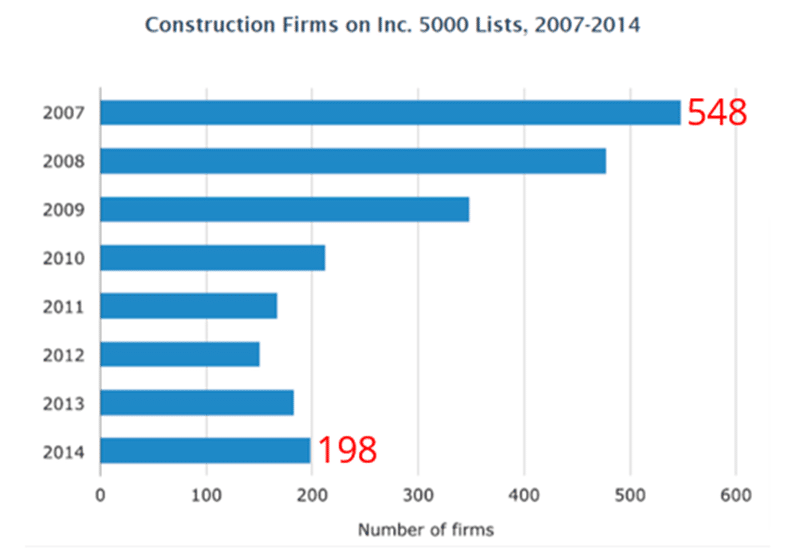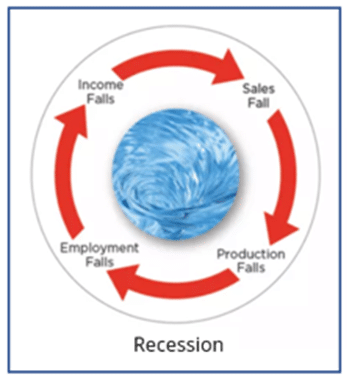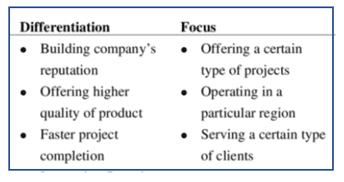Construction businesses are exposed to numerous risks even when the economy is booming.
In a recession, those risks are intensified and can easily jeopardize the survival of any construction company.
Construction businesses need to be well-prepared, flexible, and agile to navigate an economic downturn successfully.
With that in mind, here are some tips on how to recession-proof your construction business.
In this article...
Ensure Liquidity
Ensuring that your construction business doesn’t run out of money during a recession requires some skillful financial management.
In such times, your principal concern should be to ensure your business has sufficient cash reserves and cash flow. As you’ll see below, this can be achieved in several ways.
In short, your construction business is considered liquid if it has enough cash on hand or assets that can be quickly turned into cash.
Such assets can be, for example, invoices that clients owe you for the work done on a construction project.
Other assets like heavy machinery, vehicles, facilities, equipment, tools, etc., are not so easily converted into cash, which is especially true during an economic decline.
As recession is, according to Forbes, “a period of temporary economic decline,” one of its unavoidable consequences is that it suspends business growth and sends businesses into survival mode, which is not surprising considering what can happen.

Survival mode means companies will stop reinvesting their profits and start cutting costs and saving cash.
Thus, the crucial factor for your construction business to endure such periods is to ensure you have adequate cash reserves before and sufficient cash flow during a recession.
Aside from a rainy-day fund, the best way to recession-proof your business is to make sure you get paid, preferably on time and in full.
For example, you can use preliminary notices that are sent to the client before any payment is due.
They alone can accelerate payment and, in some states, also serve as the basis for filing a mechanic’s lien (construction lien, contractor’s lien).
In fact, 51% of construction businesses used notices, and 71% filed a lien over non-payment in 2021.
Another thing you can try is invoice factoring.
As we all know, payments in construction can be painfully slow (73 days on average), up to a point where it jeopardizes the liquidity of your construction business.
Naturally, things get only worse in a recession. When payments are late, you can turn to a construction factoring company like this one.

Simply put, this and other factoring companies will allow you to receive 65-95% of your invoice value 20-40 days earlier than it would be paid otherwise.
On top of that, a construction factoring company assumes the risk of collecting on the invoice.
If it gets paid in full, you’ll receive the remaining invoice value minus their factoring fee, which can be 1-5% of the total invoice amount for every 30 days it takes your client to pay them.
Before we move on, one more important tip.
Research has shown that businesses with less debt fare better during a recession because they don’t need as much cash to make interest and principal payments.
Thus, reducing your debts before a downturn enhances the survivability of your construction business.
In conclusion, ensuring your construction business is paid as promptly as possible and deleveraging will help you create an adequate financial cushion and sufficient cash flow to survive the hard times.
Don’t Stop Marketing
Although it might seem counterintuitive, one way for your construction business to survive a recession could be to ramp up your marketing budget. Or at least not reduce it. Why?
Because marketing helps you diversify your revenue streams and allows you to expand your business into new areas, making it more resilient during a recession.
The 2007-2009 Great Recession saw the total value of completed construction works plummet by 40%, and the construction industry lost around 1.5 million jobs.
Construction firms took most of the hit, and many closed doors.
This is particularly apparent when the number of construction companies on the Inc. 5000 list of fastest-growing businesses in 2007 is compared to their number five years after the recession, in 2014.

Many of those construction businesses were lost because they relied on pre-orders, i.e., future construction projects already in their pipeline.
As those projects were postponed or abandoned altogether, construction companies found themselves in need of new projects and clients.
This shows that neglecting marketing and relying on the usual clientele when the times are good can backfire when troubles arise.
Actively advertising, networking, and establishing new relationships can protect you when one or more sources of your income run into trouble and inadvertently affect your business, creating what Investopedia calls a vicious cycle.

With that in mind, marketing can also facilitate efforts to diversify your construction business in different ways, thus making it more recession-proof.
For example, contractors who work on private construction projects tend to avoid public ones due to stricter bidding rules, lower profit margins, and extra paperwork.
However, public construction works will usually keep on going during an economic downturn as they’re budgeted in advance, and their funding is already secured.
So, throwing them into the mix can help you endure a recession when your backlog of private construction projects starts shrinking.
A similar analogy can be applied to residential and commercial construction projects, where commercial projects tend to be more resilient to economic slowdowns.
However, make sure your business is ready to make such a jump, or hire an experienced manager, as these types of projects can involve different construction techniques or methods.
All in all, you should keep marketing and networking to diversify your sources of revenue when things are going great and don’t stop when they’re not.
Cut Your Expenses
When construction businesses are forced to cut their expenses to survive a recession, this might not be a bad thing.
In fact, it may be an opportunity to shed excess costs your construction firm didn’t need in the first place.
At least that’s what the authors of an analysis of overhead expenses in construction businesses during the 2007-2009 Great Recession suggest.
In their survey of 480 contractors, 95% said they reduced overhead expenses in that period, indicating that many of those costs could’ve been unnecessary to begin with.
Extrapolating this conclusion to all expenses of your construction business, there are many ways to cut costs during a recession, but some should be prepared in advance, making your business more agile in responding to market challenges.
For example, this could mean keeping a certain percentage of your (non-key) construction workers on temporary contracts or renting instead of owning some construction machinery.
Both give you an opportunity to quickly cut your expenses if construction projects are postponed or canceled during a recession.
Here’s what one survey on agile construction project practices has shown:

Along with almost half of the respondents reporting lower costs, the positive effects of business agility on productivity, quality, and client satisfaction should not be ignored.
Thus, making your business more agile before an economic downturn will make it more resilient during one.
As for cutting your costs amid a recession, one place to look for savings is certainly your inventory.
On the materials side, examine your procurement practices and seek out more affordable alternatives.
For example, you might consider buying construction materials in bulk or wholesale or using just-in-time delivery practices to cut material management costs.
When it comes to construction equipment and tools that move from site to site, the inventory of assets your business owns should be closely monitored to avoid costs of, for instance, breakdown due to poor equipment maintenance, mix-ups, or theft.
Establishing a check-in/check-out system is a good way to accomplish this.
When coupled with a tool and equipment tracking solution that allows you to track where your assets are at any moment, this system can significantly reduce asset management costs.
One easy-to-use and affordable way to do this is GoCodes Asset Tracking, which combines the power of cloud software, smartphones, and patented QR code tags.

In conclusion, being able to reduce your expenses quickly and keeping your inventory of materials and equipment optimized can help you recession-proof your construction business and make it more agile when the economy takes an upturn.
Focus on What You Do Best
Sometimes it’s best to stick to what you know.
In a recession, it might be wise to focus your construction business on core services that bring the most money and cut less profitable ones, which often include unnecessary expenses.
As Associated Builders and Contractors Chief Economist Anirban Basu emphasized, contractors are currently facing historic inflation in construction prices (24.4% compared to February 2021).
Such price jumps have been known to cause major recessions in the past.
That’s why many are afraid of what lies ahead. If you google “construction recession 2022”, you’ll get another quote by Basu:

With dark clouds on the horizon, focusing on what you do best might be a wise way to recession-proof your construction business.
Consider whether there are any types of less profitable construction projects or services you’re currently doing.
They might be sucking up resources your business could be using to strengthen more profitable core services.
Thus, placing emphasis on construction jobs your business excels at can increase the quality and productivity of your work where it matters most and cut costs associated with those less profitable projects.
You should be thinking about competitive advantages your construction business offers, such as expertise in specific types of projects, high-quality craftsmanship, or efficient project management.
This study on contractors’ competitiveness provides some examples of strategies that could prove useful in recession-proofing your business.

Naturally, a strong reputation coupled with high-quality work completed on time and within budget can keep clients knocking on your door even during economic slowdowns.
A recession can also be alleviated by smart niche positioning.
For example, focusing on residential remodeling and upgrades might secure more business during a downturn as people, unable to buy or build their new home, turn to renovating the one they have.
So, identifying the best-performing jobs and building your business reputation around them or specializing in a more recession-proof market niche can help your construction business weather any incoming storm.
Build Strong Relationships
Whether it’s new construction projects from your repeat clients, collaboration opportunities brought by your subcontractors, or more favorable terms extended by your suppliers and lenders, forging and maintaining strong relationships can make your construction business more resilient in the event of a recession.
When preparing for a recession or going through one, relationships remain at the heart of any successful construction business, starting with your clients.
Naturally, those are built on trust and accountability, among other things.
A construction project completed on time and within budget, and the client is satisfied with your work and communication usually means you’ve succeeded in building trust and demonstrating accountability.
It follows that the client will be more than willing to hire you again or recommend you to other potential clients.

So, the satisfaction of your old clients and your rapport with them can keep on bringing in work even when times are tough.
If you can add some incentives for repeat clients (or new ones referred by them), such as discounts or payment plans, this can further help your business weather the hard times.
As for subcontractors you frequently work with, maintaining good relationships can bring different collaboration opportunities that can be a lifeline for your construction business during a recession.
For example, you and your subcontractors could pool resources to bid on a construction project you alone couldn’t.
Other advantages arise from risk-sharing and collaboration, especially during a recession. You can read more about them here.

For instance, with your goals aligned, open communication, collaborative mindset, and mutual trust, you and your partners can achieve synergies that cut costs and boost productivity across the construction project lifecycle, thus making you more competitive when everyone’s looking to save money.
Finally, good relationships with your suppliers can allow you to renegotiate lower prices or more flexible payment terms.
Similarly, a good relationship with your bank or other lenders can provide easier opening of a credit line or more favorable financing terms.
So, maintaining strong relationships with your clients and subcontractors can keep new projects and opportunities coming in during a recession.
Similarly, your suppliers and lenders can provide breathing room for your construction business to survive.
Conclusion
As said in the opener, construction businesses are exposed to numerous risks even during times of economic growth, and those risks are only exacerbated when a recession hits.
Although the construction industry is particularly vulnerable to economic slowdowns, there are ways to recession-proof your business.
We hope this article serves as a good starting point for ensuring your construction business not only survives but thrives in a recession.





